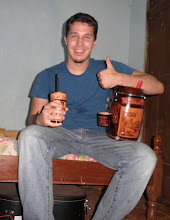First, the song is called "Say Hey" by Michael Franti & Spearhead. (Yes, Michael Franti sounds like a Finnish name, but I'm pretty sure he is not.) I have many many happy sounding songs, but this one stands out to me for some reason. The video is a lot of fun. (I especially like the little old lady movin' her hips better than I can!) It is such a simple, exuberant song; It is absolutely impossible to hear this song and be mad or unhappy. The main line of the song is nothing more or less than "I love you, I love you, I love you!" This is everything. Can you really say it any other way? It's fantastic. I have been thinking about this song for weeks, and it makes me smile every time, even just thinking about it.
"It seems like everywhere I go,
The more I see, the less I know.
But I know one thing, that I love you.
I love you! I love you! I love you!"
The message is simple, but deep.
Second, I just watched a lecture on ted.com about children in India who made a difference. Kids at the Riverside school are being taught to be Contagious. They are being challenged, taken seriously, and shown that their opinions make a difference. This is an amazing phenomenon. India is a country of a billion+ people, a large portion of whom are impoverished and uneducated. Women, and especially children, make up a huge percentage of this underprivileged class. But India's children today will be their adults in just a few years. This program is remarkable in that it focuses on childrens' ability to DO. They are challenged to say "I can."
There are three stages. It all starts with Awareness: seeing the change. For example, children at the Riverside school were being taught about child labor, and to illustrate this, they were actually made to roll incense sticks for 8 hours, just for one day. Just one day. This opened their eyes, and really personalized and drove home the realities of child labor in India.
We Americans, as a country, are blooming in the Awareness stage. We know about the big problems, like pollution, climate change, environmental degradation, AIDS and other diseases, human rights violations and so on. Television and the Internet have fostered unprecedented leaps in access to information and global awareness. Despite the pridefully militant ignorance of a certain, unfortunately vociferous minority (I view the arrogance of the smug "anti-elitist" crowd incredibly ironic), we have have an fantastic wealth of knowledge at our very fingertips. With very few exceptions, there is really no excuse for ignorance.
The next step is Enabling: being changed. Now that these children are aware of the issue at hand, the school helped support a program in which the kids went out into the community to talk to people in taxies, businesses and just on the street to spread their newfound awareness. They learn first hand the challenges and obstacles that come with being entrepreneurs of social change.
We have only just juuust begun the Enablement phase. Far too often I witness people displaying knowledge about a hot-button issue, saying it's a horrible reality of life, and doing nothing. A line from the film Hotel Rwanda, a true story about the April 1998 genocide, stuck in my mind; The main character, Paul, was questioning an American journalist as to how people could be aware of the atrocities occurring in this country, and still do nothing. The journalist made the succinct yet cuttingly true remark: "People will watch this on the evening news and say "That's horrible," and then continue eating their dinner."
Activism is hard. We are tiny people in a big world, and one little voice is easily lost in the roar of mass media and general global hugeness. But if you don't say it, and I don't say it, then who will? We need to realize, as a nation, that we ARE in the Enablement phase. We really do have the ability, as a large, listened to, democratic country, to make real changes in the world. Especially as Americans, we are in a unique position as instigators and promotors of social change. Our media, policies and language all have such a global reach, that it would be irresponsible to NOT do something.
As Gandiji put it: Be the change you want to see in the world. That is the essence of the third step: Empowerment: leading the change. With so many opportunities, so much information, and such a position of power, every one of us has the potential to be the change. There is no reason you can't. If you don't, then that is your choice. Everything else is just an excuse.
The memorable closing comment of the lecture is: "If not us, then who? If not now, then when?"
